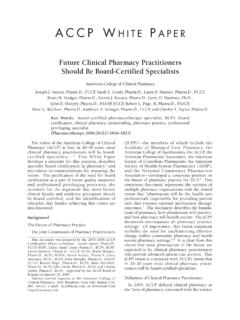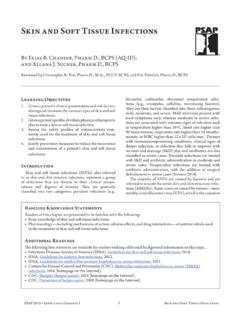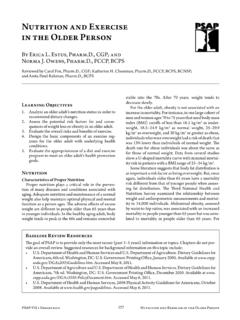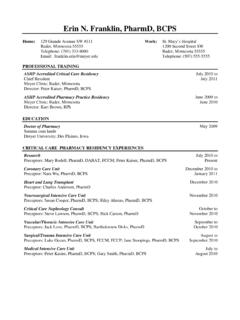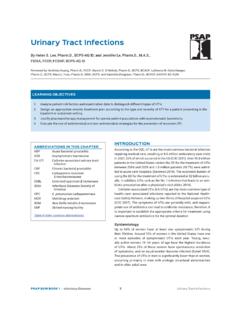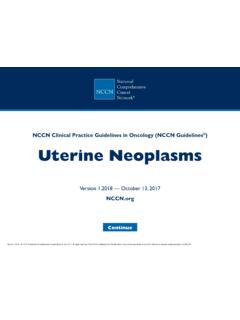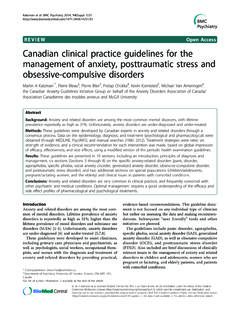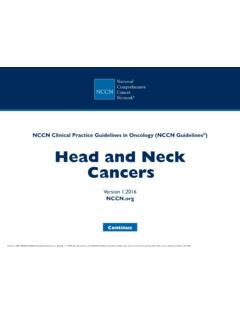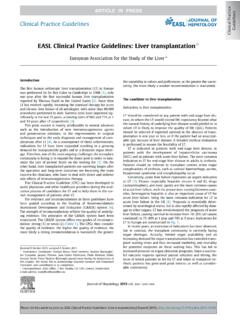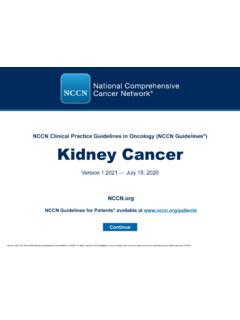Transcription of Standards of Practice for Clinical Pharmacists
1 Standards of Practice for Clinical Pharmacists American College of Clinical Pharmacy This document sets forth ACCP's expectations for clini- II. Process of Care cal Pharmacists within the United States and countries around the world where Clinical pharmacy is emerging. Clinical Pharmacists work in collaborationa with other It is also intended to serve as a reference for those de- providers to deliver comprehensive medication man- signing and assessing Clinical pharmacy education and agement that optimizes patient outcomes. Care is coor- training programs.
2 In addition to articulating the Clinical dinated among providers and across systems of care as pharmacist's process of care and documentation, the patients transition in and out of various settings. eight Standards below address the Clinical pharmacist's involvement in collaborative, team-based Practice and The Clinical pharmacist's process of care comprises the privileging; professional development and maintenance following components. of competence; professionalism and ethics; research and scholarship; and other professional responsibilities.
3 A. Assessment of the patient The Standards define for the public, health profession- The Clinical pharmacist assesses medication- als, and policy-makers what they can and should expect relatedb needs by: of Clinical Pharmacists . Reviewing the medical record using a problem- oriented framework ( , interpreting and ana- I. Qualifications lyzing subjective and objective information) to determine the Clinical status of the patient;. Clinical Pharmacists are practitioners who provide com- Meeting with the patient/caregivers to obtain prehensive medication management1 and related care and document a complete medication history to for patients in all health care settings.
4 They are licensed identify all of the patient's current medicationsc Pharmacists with specialized advanced education and (including regimens and administration routes), training who possess the Clinical competencies neces- medication-taking behaviors, adherence, aller- sary to Practice in team-based, direct patient care envi- gies, and attitudes and experiences with medica- ,3 Accredited residency training or equivalent post-licensure experience is required for entry into di- tion therapyd;. Obtaining, organizing, and interpreting patient rect patient care Practice .
5 Board certification is also re- quired once the Clinical pharmacist meets the eligibility data; and criteria specified by the Board of Pharmacy Specialties Prioritizing patient problems and medication-related (BPS).4 needs. a Collaboration in the context of this document refers to collaborative and cooperative Practice activities performed by the Clinical phar- macist as authorized by 1) state Practice acts and 2) formal collaborative drug therapy management agreements with other providers and/. or conferred by local privileging within the relevant Practice , health system, organization, or institution.
6 B Medication-related applies to issues pertaining to 1) the indication/absence of indication, use and administration, therapeutic goals, adverse drug events, drug interactions, and monitoring of medications; 2) the patient's adherence, attitudes, beliefs, and preferences re- garding his/her medications; and 3) any allergies or adverse reactions to medications. c Medications are defined as any of the following: prescription drugs, non-prescription drugs, vaccines, or complementary and alterna- tive medications. d Some patient conditions and Clinical settings ( , in an intensive care unit, mental health facility, or emergency department) may render this activity unfeasible.
7 Standards of Practice for Clinical Pharmacists 1 American College of Clinical Pharmacy B. Evaluation of medication therapy meeting with the patient/caregivers to obtain The Clinical pharmacist identifies strategies to an updated medication history to identify, as- optimize medication therapy by: sess, and document any new medication-related Assessing, with other members of the health care needs or problems;. team, the appropriateness of current medications Conducting ongoing assessments and refining the on the basis of health conditions, indication, and the plan of care to optimize medication therapy and therapeutic goals of each medication; ensure that individual goals are achieved; and Evaluating the effectiveness, safety, and affordability Monitoring, modifying, documenting, and man- of each medication.
8 Aging the plan of care in collaboration with the Assessing medication-taking behaviors and adher- patient/caregivers and his/her other health care ence to each medication; and providers. Identifying medication-related problems and eval- uating collaboratively with other members of the III. Documentation health care team the need for intervention. Clinical Pharmacists document directly in the patient's C. Development and implementation of a plan of care medical record the medication-related assessment and The Clinical pharmacist develops and implements, plan of care to optimize patient outcomes.
9 This docu- collaboratively with the patient and his/her health care mentation should be compliant with the accepted stan- providers, a plan for optimizing medication therapy by: dards for documentation (and billing, where applicable). Reviewing the patient's active medical problem list within the health system, health care facility, outpatient to inform and guide the development of an individ- Practice , or pharmacy in which one works. Where appli- ualized assessment and plan for optimizing medica- cable, accepted Standards must be considered as they tion therapy; relate to the use of electronic health records (EHRs), Formulating a comprehensive medication manage- health information technology and exchange systems, ment assessment and plane in collaboration with and e-prescribing.
10 The health care team and implementing this plan to achieve patient-specific outcomes;. The following components of the encounter are essen- Educating the patient/caregivers (both verbally and tial to include in the documentation, which may be com- in writing) to ensure understanding of the care plan, municated in the form of a traditional SOAP (subjective to optimize adherence, and to improve therapeutic data, objective data, assessment, plan) note or other outcomes; and Establishing patient-specific measurable parame- framework consistent with the Standards of documenta- ters and time frames for monitoringf and follow-up tion within the Practice setting.
